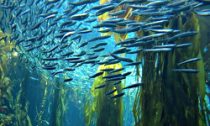
Coral reefs, kelp forests and other marine ecosystems may be tougher than we give them credit for, a new study suggests. While countless scientific reports have documented the ravages of climate change on oceanic life, a survey of the researchers who wrote them provides a silver lining: An overwhelming majority noticed examples of sea life withstanding climate change.
“There are instances where sensitive ecosystems have shown remarkable resilience after climatic events. You can think of them as ‘bright spots’: They demonstrate that there are conditions under which ecosystems can persist even with major climate disturbances,” said Jennifer O’Leary, a marine conservation biologist with California Polytechnic State University and leader of the study.
The results of the survey were compiled in a report published in the journal BioScience. In all, 97 researchers were polled; 80 percent of those who had witnessed climatic disturbances also reported noting instances of resilience. A similar survey that looked at expert-recommended papers on ecosystems found examples of resilience in 85 percent of them.
In Western Australia, for instance, a reef lost 90 percent of its live coral after a bleaching event. But 12 years later, it had restored itself to 44 percent of its normal size. Meanwhile, after an El Niño-related current destroyed kelp forests off California’s coast, they were able to bounce back within half a decade.
Identifying examples of resilience and highlighting the reasons behind it could prove to be a valuable blueprint for conservation experts, said O’Leary. It could provide them information on local conditions that could bolster ecosystems and guide their strategies to protect them.
“This study provides a broad scope approach to identifying places that have qualities to them that might be resilient to large-scale disturbances,” explained Charles Boch, a postdoctoral fellow with the Monterey Bay Aquarium Research Institute. “Kelp forests and coral systems provide high-relief structures where many other organisms can live or be protected, so they provide a lot of different services, including habitats for economically relevant organisms.”
Conservationists can use the results of the survey as a template to identify factors that contribute to resilience. While some, like hydrological conditions, are beyond human control, others can be replicated at different marine ecosystems around the world.
“For instance, maintaining and promoting connectivity among habitats and protecting pristine or remnant populations of habitat-forming species — such as coral and kelp — can dramatically foster recovery after extreme climatic events,” said Giulio De Leo, with Stanford University’s Hopkins Marine Station, who also worked on the study. “Reducing or removing additional causes of stress whenever possible, such as pollution and sediment transport, is also a key factor to promote resilience in the majority of coastal marine ecosystems.”
O’Leary acknowledged that there is a danger that the positive tone of this report could be misinterpreted to bolster arguments against climate action. However, she added that the authors have been careful in framing their findings as one aspect of climate research.
“This paper is not trying to say that climatic pressures are unimportant. In fact, it’s highlighting that they are incredibly important — but there are things that help, so we have to work both on reducing the things that are causing climate changes, plus managing ecosystems to make them as resilient as possible to these changes when they happen,” she said.
There is still a lot that we don’t know about ecosystems, according to De Leo, especially since oceans and still largely “unknown and mysterious environments” for scientists. Some gaps in the research include getting a better understanding of the distribution of species and habitats, understanding how marine populations respond to stressors and looking at how changes in climate can affect individual species and ecological communities.
“Only in recent decades, we started to develop the underwater technology and the means to investigate our marine ecosystems,” he said. “While we have done already a lot of progress, the truth is that we have just started to scratch the surface — literally.”












Social Profiles